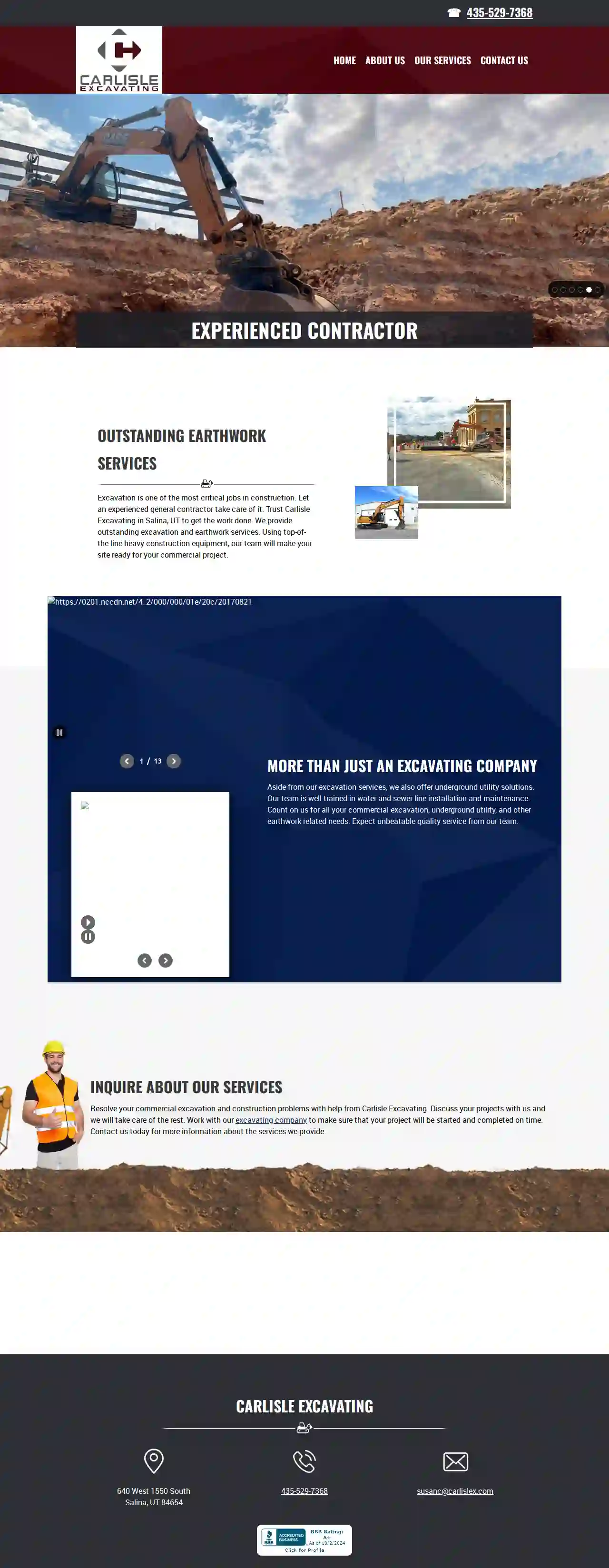Excavation Contractors Carlisle
Top Excavation Company Near Me in Carlisle
Get 3 FREE Trenching Services quotes for your project today! Compare profiles, reviews, accreditations, portfolio, etc... and choose the best service.
- Ki
Kirkaldy & Roe Ltd
3.73 reviewsCarlisle, GB- Services
- Why Us?
Get Quote - St
Stephen Carruthers
1Carlisle, GB- Services
- Why Us?
Get Quote - Bo
Border Groundworks and Maintenance
52 reviewsCarlisle, GB- Services
- Why Us?
Get Quote - Ho
Howard Armstrong Drainage
517 reviewsCarlisle, GB- Services
- Why Us?
Get Quote 
Carlisle Excavating
4.88 reviews640 West 1550 South, Salina, 84654, GBDependable Construction Company Hire a reputable contractor to work on your construction project. When it comes to prompt and dependable commercial excavation services, Carlisle Excavating in Salina, UT is the construction company you can count on. We are committed to delivering high-quality work that will give you complete satisfaction. Our team has extensive experience in the industry and can handle minor to complicated earthmoving jobs. We serve the southern half of the state of Utah. Why Choose Us? Equipped, Honest, and Knowledgeable Team Excellent Customer Service Free Estimates Available Licensed and Insured Construction Company Quick Turnaround Time Give Us a Call Today Every member of our staff works hard to earn your trust and exceed your expectations. Place your confidence in our construction team and you will not be disappointed with the quality of work. Give us a call today to learn more about our excavation and other earthmoving services. We are more than happy to assist you with your concerns.
- Services
- Why Us?
- Gallery
Get Quote- Ga
Gary Ward Drainage
54 reviewsCarlisle, GB- Services
- Why Us?
Get Quote
Over 11,537+ Excavation Pros on our directory
Our excavation pros operate in Carlisle & surroundings!
ExcavationHQ has curated and vetted Top Excavation Companies in and around Carlisle. Find the most trustworthy pro today.
Frequently Asked Questions About Excavation Contractors
- Project Size and Scope: Larger, more complex excavations naturally take longer.
- Soil Conditions: Rocky or challenging soil types can slow down progress.
- Site Accessibility: Limited access might require more time for maneuvering equipment and hauling materials.
- Weather: Inclement weather can cause delays.
- Permitting and Inspections: Waiting for permits or inspections can extend the timeline.
- Clearly Define the Scope: Outline the project's goals, including the excavation area, depth, grade, and intended use.
- Obtain Necessary Permits: Research and acquire any required permits from your local authorities.
- Mark Utility Lines: Contact your utility companies to locate and mark underground utilities to prevent damage.
- Communicate with Neighbors: Inform your neighbors about the project's timeline and potential noise or disruptions.
- Prepare the Site: Clear any obstacles, such as vegetation, furniture, or structures, from the excavation area.
- Discuss Safety Protocols: Review safety procedures with the contractor to ensure a safe work environment.
How long does an excavation project take?
What is the difference between cut and fill excavation?
Cut: Involves excavating soil from an area where the existing grade is higher than the desired grade.
Fill: Refers to using the excavated soil ('cut' material) to raise the grade in an area where the existing grade is lower than desired.
This method minimizes the need to import or export soil, reducing costs and environmental impact. It's commonly used for site preparation, road construction, and landscaping.
What should I do before excavation starts?
What is the difference between topsoil and subsoil?
Topsoil: The uppermost layer, typically rich in organic matter, nutrients, and microorganisms. It's essential for plant growth and is often darker in color.
Subsoil: The layer beneath the topsoil, containing less organic matter and generally denser. It provides support for roots but is less fertile than topsoil.
During excavation, topsoil is often removed and preserved separately for later use in landscaping, while subsoil is typically used for backfilling or other less demanding applications.
How long does an excavation project take?
- Project Size and Scope: Larger, more complex excavations naturally take longer.
- Soil Conditions: Rocky or challenging soil types can slow down progress.
- Site Accessibility: Limited access might require more time for maneuvering equipment and hauling materials.
- Weather: Inclement weather can cause delays.
- Permitting and Inspections: Waiting for permits or inspections can extend the timeline.
What is the difference between cut and fill excavation?
Cut: Involves excavating soil from an area where the existing grade is higher than the desired grade.
Fill: Refers to using the excavated soil ('cut' material) to raise the grade in an area where the existing grade is lower than desired.
This method minimizes the need to import or export soil, reducing costs and environmental impact. It's commonly used for site preparation, road construction, and landscaping.
What should I do before excavation starts?
- Clearly Define the Scope: Outline the project's goals, including the excavation area, depth, grade, and intended use.
- Obtain Necessary Permits: Research and acquire any required permits from your local authorities.
- Mark Utility Lines: Contact your utility companies to locate and mark underground utilities to prevent damage.
- Communicate with Neighbors: Inform your neighbors about the project's timeline and potential noise or disruptions.
- Prepare the Site: Clear any obstacles, such as vegetation, furniture, or structures, from the excavation area.
- Discuss Safety Protocols: Review safety procedures with the contractor to ensure a safe work environment.
What is the difference between topsoil and subsoil?
Topsoil: The uppermost layer, typically rich in organic matter, nutrients, and microorganisms. It's essential for plant growth and is often darker in color.
Subsoil: The layer beneath the topsoil, containing less organic matter and generally denser. It provides support for roots but is less fertile than topsoil.
During excavation, topsoil is often removed and preserved separately for later use in landscaping, while subsoil is typically used for backfilling or other less demanding applications.